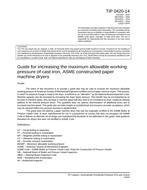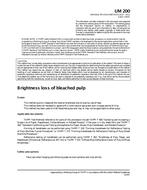This practice is for identifying papers and boards that will tarnish or stain metal plates. The appearance of the tarnish, stain, or corrosion of metal by a test specimen of the sample is reported, together with the distribution of the tarnishing or staining. Reducible sulfur activity is a common cause of tarnishing.
This practice was formerly an Official Method specific to silver tarnishing, with other types of metal plates referenced as modifications. This practice expands the scope of the testing and clearly indicates that the procedure is intended to be a qualitative evaluation.
Certain sample types, such as water repellent or metal-coated papers, or board may require modification of the test procedure. In most cases, water repellant or metal-coated samples may be tested without wetting the test specimen and by prolonging the time in contact between the sample and plate to at least 24 h. When such sample types are tested, state any modification of the practice in the report.
The principles involved in this standard practice may be used to test paper samples for the tarnish, stain, or corrosion properties with respect to a variety of metals, such as steel, copper, nickel, brass, etc. It is necessary to use plates or forms of the particular metal or alloy in question and to make other modifications as may be required for the particular purpose. For example, in the case of metal that would rust, the paper might not be wetted; it could instead be heated in an atmosphere of high humidity.
Specific procedures for testing for tarnishing, staining, or corroding paper samples are not included in this standard practice. This practice describes the procedural framework and the required included information of a report generated by employing this practice.
Product Details
- Published:
- 2021
- ANSI:
- ANSI Approved
- Number of Pages:
- 4
- File Size:
- 1 file , 240 KB
- Note:
- This product is unavailable in Belarus, Russia, Ukraine


